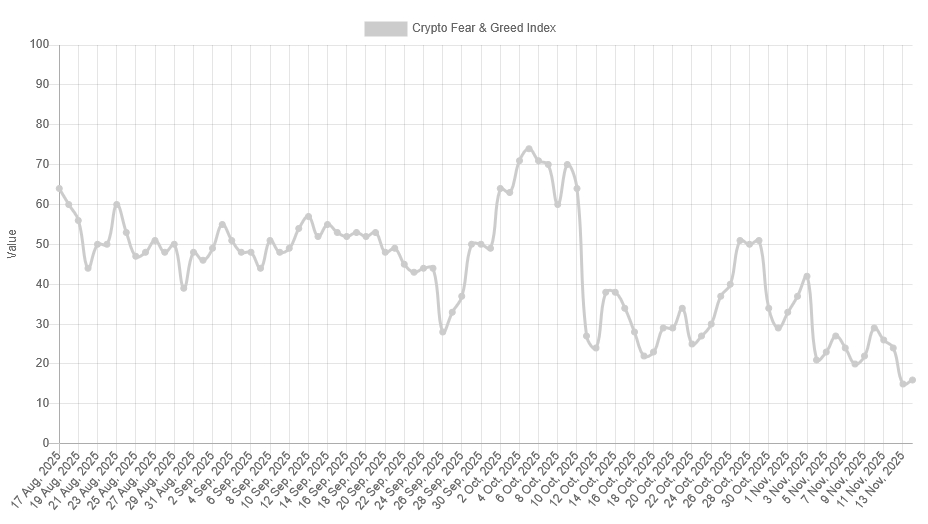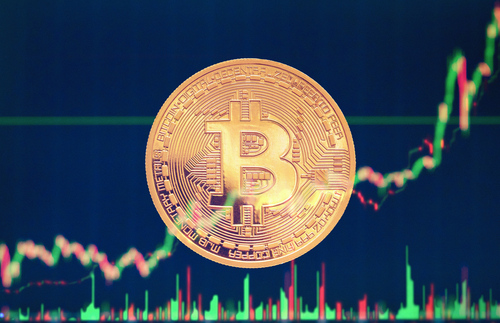Bitcoin Tumbles into Bear Market, Sparking Bargain Hunt Below $100,000

TradingKey - Bitcoin plunged into a technical bear market, shedding over 20% from its October high after struggling at $100,000. Second-Largest Record ETF outflows fueled jitters, though external factors driving the correction offer long-term holders some solace.
As of Friday, November 14, Bitcoin's price has fallen approximately 6% in 24 hours to $96,829.97. This marks a decline of over 23% from its all-time high of $126,198.07 set on October 7.
Ethereum's price also dropped approximately 10% over the same period, trading at $3,156.24. Meanwhile, major altcoins such as Ripple, Solana, and Cardano each fell by around 8%.
The Crypto Fear & Greed Index, a key gauge of market sentiment, plummeted to 15 points on Thursday. This marks its first dip below 20 since February, underscoring a shift among crypto investors from last month's greed to a more risk-averse stance.

10x Research indicated that the cryptocurrency market has entered a confirmed bear state. This is attributed to weak ETF capital flows, continued selling by long-term holders, and sluggish participation from retail buyers. Furthermore, the firm highlighted $93,000 as the next critical price level to watch.
The contraction in Bitcoin ETF net inflows, coupled with the rising dominance of stablecoins, serves as evidence that investors are either selling off positions or remaining on the sidelines. According to SoSo Value data from Thursday, the 11 U.S.-listed spot Bitcoin ETFs collectively recorded net outflows of $869.89 million, marking the second-highest outflow volume on record.
Concurrently, USDT, the largest stablecoin, saw its market dominance climb to its highest level since April. This surge signals a preference for capital protection among market participants.
Despite recent supply pressure from large-scale selling by long-term holders, relatively optimistic crypto observers suggest this is normal behavior for Bitcoin whales (investors holding significant amounts of Bitcoin) during a bull cycle.
They argue that the true culprit pushing Bitcoin into a technical bear market lies externally: Federal Reserve officials' hesitation regarding a December rate cut and concerns over tech stock valuations, which have collectively weighed on overall risk asset sentiment.
Glassnode noted that selling pressure from Bitcoin whales is typical of later-stage cryptocurrency cycles and should not be a greater cause for concern than in the past.
Conversely, the daily average accumulation by long-term holders has surged from 12,000 Bitcoins in early July to a current 26,000. This consistent and regular distribution suggests the market is not in an "OG selling" mode.
Kronos Research echoed this sentiment, asserting that whale selling represents structured cyclical flows and steady profit rotation, rather than a panic-driven exodus. This pattern often indicates a market nearing the end of a cycle, but it doesn't necessarily mean the market has peaked, provided there are still buyers to absorb the new supply.
Kronos further analyzed that significant capital outflows imply a risk-off reset, reflecting institutions scaling back amid macroeconomic headwinds. While this dynamic suppresses short-term momentum, it does not diminish broader structural demand. Ultimately, these outflows combined with oversold conditions present opportunities for long-term strategists.
It remains premature to conclude whether the cryptocurrency market has lost favor with retail and institutional investors. Given the general absence of significant internal structural concerns, investors have reason to anticipate that clearer macroeconomic dynamics could facilitate a meaningful rebound for Bitcoin, with $100,000 still serving as a crucial price benchmark.
This content was translated using AI and reviewed for clarity. It is for informational purposes only.








